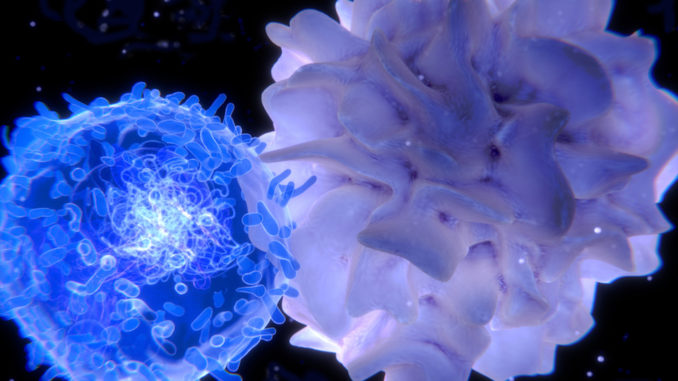
Vedanta Biosciences, a clinical-stage company developing a new category of therapies for immune-mediated diseases based on rationally-defined consortia of human microbiome-derived bacteria, announced preclinical data for VE800, the Company’s orally-administered, live biotherapeutic product candidate in immuno-oncology.
The study showed that VE800 elicited an anti-tumor immune response as a monotherapy and also enhanced effects of immune checkpoint inhibitors. Additionally, the results describe a mechanism of action for VE800 as the robust interferon-gamma producing CD8+ (cytotoxic) T cell response was elicited via activation of dendritic cells. The data will be presented at the Society for Immunotherapy of Cancer’s (SITC) 33rd Annual Meeting by Dr. Bruce Roberts, Chief Scientific Officer of Vedanta Biosciences, on November 8. Vedanta Biosciences expects to initiate a clinical study of VE800 in mid-2019.
“Our work shows that VE800 induces robust tumor infiltration by cytotoxic T cells – one of the strongest predictors of response to checkpoint inhibitors – and promotes suppression of tumor growth and enhanced survival in a range of cancer models,”
said Bruce Roberts, Ph.D., Chief Scientific Officer of Vedanta Biosciences.
“To our knowledge, VE800 is the most advanced immuno-oncology product candidate based on a defined consortium of human microbiome-derived bacteria, a therapeutic modality that Vedanta is pioneering. With our cGMP manufacturing processes in place, we’re well-positioned to take VE800 into the clinic in the coming months.”
In the preclinical study, VE800 was assessed alone and in combination with various checkpoint inhibitors in colon carcinoma and melanoma tumor models. VE800 was assessed for its ability to induce CD8+ T cells, an important marker of anti-tumor response, as well for its ability to influence accumulation of tumor infiltrating lymphocytes. The study was conducted in collaboration with Dr. Kenya Honda of Keio University, a leader in the microbiome field and a scientific co-founder of Vedanta Biosciences.
Data highlights include:
1. VE800 robustly promoted induction of interferon-gamma producing CD8+ T cells via activation of intestinal dendritic cells and stimulation of interferon-gamma producing CD8+ T cells in a manner dependent on the transcription factor BATF3
2. VE800 enhanced the anti-tumor activity of both anti-PD-1 and anti-CTLA4 antibodies by increasing the level of tumor infiltrating CD8+ T cells
3. VE800 also promoted systemic immune cell activation as evidenced by accumulation of CD8+ T cells in the spleen.
Unlike fecal transplants or single strain approaches to microbiome modulation, Vedanta Biosciences uses pure, clonal cell banks to produce defined collections, or consortia, of bacterial strains designed to effect durable therapeutic changes in a patient’s microbiota. This bypasses the need to rely on direct sourcing of fecal donor material of inconsistent composition.

